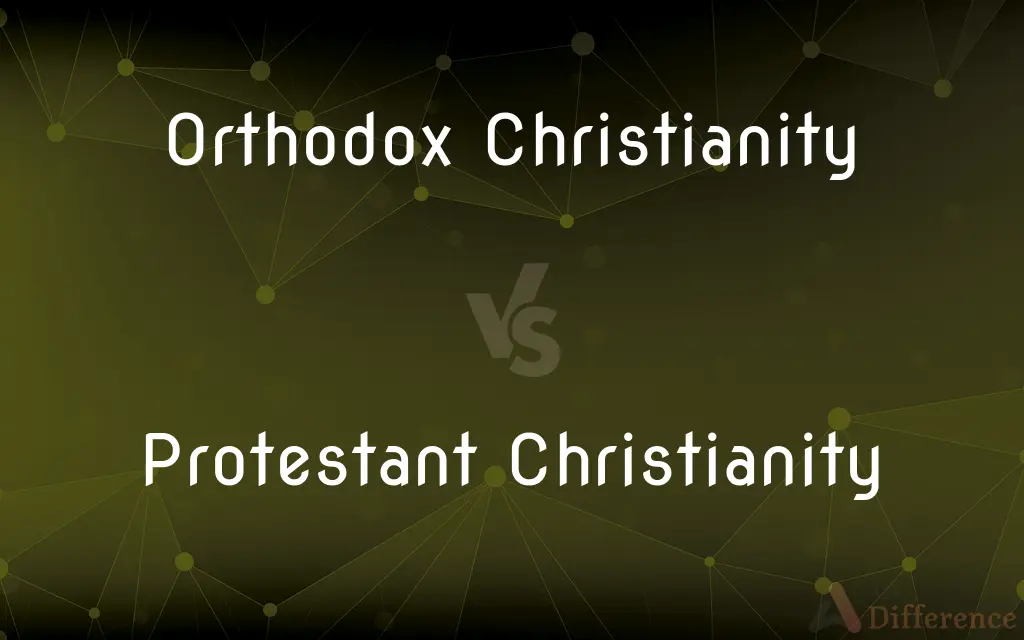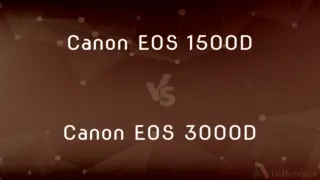Orthodox Christianity vs. Protestant Christianity — What's the Difference?
By Tayyaba Rehman — Published on January 24, 2024
Orthodox Christianity maintains ancient liturgical traditions and hierarchical structure, while Protestant Christianity arose from Reformation, emphasizing scripture and individual faith.

Difference Between Orthodox Christianity and Protestant Christianity
Table of Contents
ADVERTISEMENT
Key Differences
Orthodox Christianity, rooted in the Eastern Christian tradition, is characterized by its continuity with the liturgy, doctrines, and practices of the early Church. It maintains a strong focus on mysticism and liturgical worship. Protestant Christianity, originating from the 16th-century Reformation, focuses on the authority of Scripture over church traditions and emphasizes personal faith and direct relationship with God, diverging from certain rituals and beliefs of the early Church.
The leadership structure in Orthodox Christianity consists of a hierarchy of bishops, with the Ecumenical Patriarch of Constantinople holding a place of honor but not absolute authority. In contrast, Protestant Christianity generally rejects hierarchical leadership, with individual churches often governed by congregational leadership or through denominational structures.
Orthodox Christianity places a strong emphasis on the sacraments, particularly the Eucharist, as a means of grace and participation in the life of the Church. Protestant Christianity, while also recognizing sacraments like baptism and communion, often views them more symbolically and varies significantly in sacramental theology across different denominations.
In terms of worship, Orthodox Christianity is known for its elaborate and symbolic liturgy, including the use of icons and a traditional liturgical calendar. Protestant Christianity encompasses a wide range of worship styles, from the liturgical to the contemporary, with some denominations eschewing traditional liturgical forms altogether.
Orthodox Christianity adheres to the decisions of the first seven ecumenical councils for doctrinal matters. In Protestant Christianity, there is a wide diversity of doctrinal beliefs, with individual interpretation of the Bible being a cornerstone, leading to the formation of numerous denominations with varying beliefs and practices.
ADVERTISEMENT
Comparison Chart
Origin
Eastern Christian tradition
16th-century Reformation
Leadership Structure
Hierarchical with bishops
Often congregational or denominational
Sacraments
Central, with mystical emphasis
Varied views, often symbolic
Worship Style
Elaborate, traditional liturgy
Ranges from liturgical to contemporary
Doctrinal Basis
First seven ecumenical councils
Diverse, based on scripture interpretation
Compare with Definitions
Orthodox Christianity
Known for the use of icons and a traditional liturgical calendar.
Icons are venerated in Orthodox Christian churches.
Protestant Christianity
Characterized by a diversity of denominations and beliefs.
Protestant Christianity includes many denominations like Lutherans, Baptists, and Methodists.
Orthodox Christianity
Adheres to the teachings of the first seven ecumenical councils.
Orthodox Christianity’s doctrine was shaped significantly by the early ecumenical councils.
Protestant Christianity
Emerged from the Reformation, emphasizing scripture and personal faith.
Protestant Christianity often interprets the Bible through a personal lens.
Orthodox Christianity
Emphasizes the importance of sacraments and mysticism.
The Eucharist is central in Orthodox Christian worship.
Protestant Christianity
Has diverse views on sacraments and their meanings.
Baptism in Protestant Christianity can vary from symbolic to a declaration of faith.
Orthodox Christianity
An ancient Christian tradition with a focus on liturgical worship.
The Orthodox Church celebrates Easter based on the Julian calendar.
Protestant Christianity
Rejects a centralized authority in favor of congregational leadership.
Many Protestant churches are governed by their congregation or elected leaders.
Orthodox Christianity
Maintains a hierarchical structure of bishops.
In Orthodox Christianity, the bishop plays a key role in church governance.
Protestant Christianity
Encompasses a wide range of worship styles.
Worship in Protestant churches can range from traditional to contemporary music.
Common Curiosities
What is the main focus of Orthodox Christianity?
Orthodox Christianity focuses on continuity with early Church traditions and liturgical worship.
What distinguishes Protestant Christianity?
It's distinguished by its emphasis on scriptural authority and personal faith.
What is the leadership structure in Protestant Christianity?
Leadership varies, often based on congregational or denominational governance.
How does Orthodox Christianity view the sacraments?
Sacraments are central and mystical in Orthodox Christianity.
What is the Protestant view of sacraments?
Views vary, but they are often seen more symbolically.
What is unique about Orthodox Christian worship?
It is known for its elaborate and traditional liturgy.
What doctrinal basis does Orthodox Christianity follow?
It adheres to the decisions of the first seven ecumenical councils.
How does worship vary in Protestant Christianity?
Worship styles range widely, from traditional to contemporary.
How do Protestant Christians interpret doctrine?
Doctrine is based on individual interpretation of the Bible.
Do Protestant Christians recognize Orthodox sacraments?
Recognition varies among denominations, but there's generally respect for each other's practices.
How does leadership work in Orthodox Christianity?
It has a hierarchical structure with a system of bishops.
Can Orthodox Christians be part of the Protestant Church?
Orthodox Christians follow different traditions and are usually not part of Protestant denominations.
Share Your Discovery

Previous Comparison
Rap vs. Hip Hop
Next Comparison
Canon EOS 1500D vs. Canon EOS 3000DAuthor Spotlight
Written by
Tayyaba RehmanTayyaba Rehman is a distinguished writer, currently serving as a primary contributor to askdifference.com. As a researcher in semantics and etymology, Tayyaba's passion for the complexity of languages and their distinctions has found a perfect home on the platform. Tayyaba delves into the intricacies of language, distinguishing between commonly confused words and phrases, thereby providing clarity for readers worldwide.
















































